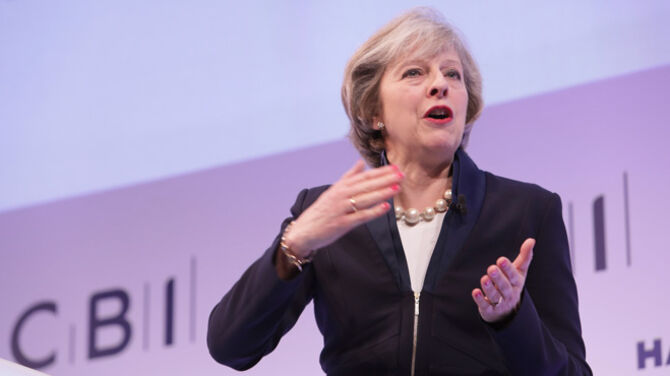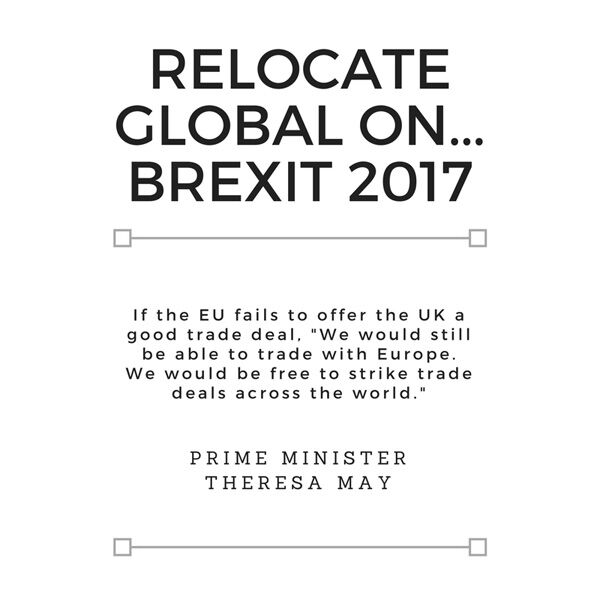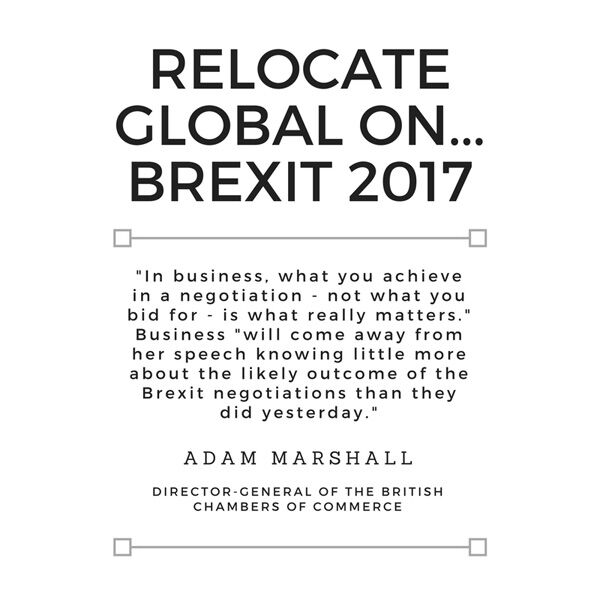Brexit news: May rules out single market and free movement

copyright, the CBI. This work is licensed under a Creative Commons Attribution-NonCommercial-ShareAlike 2.0 Generic License. https://creativecommons.org/licenses/by-nc-sa/2.0/
Brexit: UK to seek a "new, comprehensive, bold and ambitious free trade agreement"
Instead, the prime minister said she would seek a customs agreement with the remaining 27 EU states - while not necessarily remaining part of the Customs Union - and would seek the "greatest possible access" to the single market through a "new, comprehensive, bold and ambitious free trade agreement".The latter, she said, could take in elements of single market arrangements in areas such as financial services and the automotive industry.
Brexit: PM suggests UK taxes could be slashed to lure investment from Europe
And she suggested the UK could slash taxes to poach investment from Europe if the EU failed to offer the UK a good trade deal. "We would still be able to trade with Europe. We would be free to strike trade deals across the world," she said."And we would have the freedom to set the competitive tax rates and embrace the policies that would attract the world’s best companies and biggest investors to Britain. And – if we were excluded from accessing the single market – we would be free to change the basis of Britain’s economic model."Related articles:
- Talking Brexit
- Needed urgently: ambassador to handle Brexit negotiations
- Ex-PM backs Commonwealth trade deals and relaxed visas
Brexit: Control of borders
Mrs May, who repeated her aim of reaching an early deal to secure the status of British expats living in the EU and those from the continent currently residing in Britain, insisted the UK must regain control of its borders."We will get control of the number of people coming to Britain from the EU. Because, while controlled immigration can bring great benefits, filling skill shortages, delivering public services, making British businesses the world beaters they often are, when the numbers get too high, public support in the system falters," she said.Although Mrs May said that she had already discussed the fate of 1.2 million Britons estimated to be living on the Continent and the three million EU expats living in Britain, her comments did little to assuage Nicholas Hatton, founder of the3million pressure group, which campaigns on behalf of Europeans in the UK.“EU citizens are living in limbo and Theresa May has done very little to reassure them today,” he said. “I am very disappointed that the prime minister didn’t take this opportunity in front of an international audience to unilaterally guarantee our rights of residence and we will continue to campaign to obtain a firm guarantee before Article 50. We are not bargaining chips. We are human beings.”Brexit: Northern Ireland and the Republic of Ireland
The PM also said that the UK would work to maintain the common travel area with the Republic of Ireland and would retain "practical arrangements on law enforcement and the sharing of intelligence material" with the remaining EU nations, as well as continuing to work closely with European allies on foreign and defence policy.An Irish government spokesman in Dublin welcomed the prime minister’s commitment to maintaining the common travel area between Britain and Ireland, as well as her promise that there would be no “hard border” between Northern Ireland and the Republic.He also said there were now “economic opportunities that may arise for Ireland” following Mrs May's announcement that the UK would quit the single market and, perhaps, the Customs Union.“Bids for the EU agencies currently located in London – the European Medicines Board and the European Banking Authority have already been announced and the state enterprise agencies are actively pursuing opportunities for increased investment, business and job creation in Ireland,” he said. “Economic opportunities for Ireland will be pursued vigorously."More related articles:
- Davos 2017: China president calms stormy economic waters
- UK CEOs concerned about soaring employee skill gap
- Trump willing to do ‘quick’ post-Brexit US-UK trade deal
Brexit: Deal will go before Houses of Parliament
In her speech, Mrs May also revealed: "I can confirm today that the government will put the final deal that is agreed between the UK and the EU to a vote in both Houses of Parliament before it comes into force." However, she did not say whether a government defeat would result in the Brexit deal being scrapped.Brexit: International reaction to Prime Minister Theresa May's statement
Reacting to the speech, Frank-Walter Steinmeier, Germany's foreign minister, said: "We welcome that the British prime minister today sketched out her government’s ideas about its departure and at last created a bit more clarity about the British plans. She has underlined that Great Britain is seeking a positive and constructive partnership, a friendship, with a strong EU. That is good."We also want a relationship that is as good, close and trusting, and hope for constructive negotiations with this goal in mind. But our line remains: negotiations will only begin when Great Britain has officially announced its desire to leave. Tomorrow we will vote in our Brexit cabinet committee on the German position during the upcoming negotiations.It is in Germany’s interest and in the interest of Europe to strengthen the cohesion of the European Union of 27 members and preserve the unity of the single market."
 Get access to our free Global Mobility Toolkit
Get access to our free Global Mobility Toolkit 
©2026 Re:locate magazine, published by Profile Locations, Spray Hill, Hastings Road, Lamberhurst, Kent TN3 8JB. All rights reserved. This publication (or any part thereof) may not be reproduced in any form without the prior written permission of Profile Locations. Profile Locations accepts no liability for the accuracy of the contents or any opinions expressed herein.

























